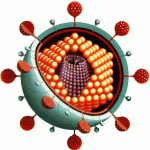Virology
|
3 october 2014 19:34:29 |
| Development of kinomic analyses to identify dysregulated signaling pathways in cells expressing cytoplasmic PrP (Virology Journal) |
|
Tweet Background:
Dysregulated protein kinase signaling is involved in the pathogenesis of many chronic diseases. However, the dysregulated signaling pathways critical to prion pathogenesis remain incompletely characterized. Global analyses of signaling pathways may be useful to better characterize these pathways. We therefore set out to develop such global assays. To this end, we used as a model cytoplasmic mutants of the cellular prion protein (PrPC), which are toxic to N2a neuroblastoma cells. We tested the global assays for their sensitivity to detect changes in signaling pathways in cells expressing cytoplasmic PrP mutants.
Methods:
We developed a targeted proteomics (kinomics) approach using multiplex Western blots to identify signaling pathways dysregulated in chronic neurological pathologies. We tested the approach for its potential ability to detect signaling changes in N2a cells expressing cytoplasmic PrP mutants.
Results:
Multiplex Western blots were designed to quantitate the expression levels of 137 protein kinases in a single membrane and using only 1.2 mg of sample. The response of the blots was sensitive and linear to changes of 6% in protein levels. Hierarchical and functional clustering of the relative expression levels identified an mTOR signaling pathway as potentially dysregulated in N2a cells expressing cytoplasmic PrP. The mTOR signaling pathway regulates global protein synthesis, which is inhibited in cells expressing cytoplasmic PrP. The levels of proteins involved in the Akt1/p70S6K branch of mTOR signaling changed in synchrony with time of cytoplasmic PrP expression. Three kinases in this pathway, Akt, p70S6K, and eIF4B were in their inactive states, as evaluated by phosphorylation of their regulatory sites.
Conclusion:
The results presented are consistent with the previously reported inhibition of Akt/p70S6K/eIF4B signaling as mediating pathogenesis of cytoplasmic PrP. We conclude that the kinomic analyses are sensitive and specific to detect signaling pathways dysregulated in a simple in vitro model of PrP pathogenesis. |
| 162 viewsCategory: Virology |
 Resistance to N-peptide fusion inhibitors correlates with thermodynamic stability of the gp41 six-helix bundle but not HIV item kinetics (Retrovirology) Resistance to N-peptide fusion inhibitors correlates with thermodynamic stability of the gp41 six-helix bundle but not HIV item kinetics (Retrovirology)Endogenous lentivirus in Malayan colugo ( Galeopterus variegatus ), a close relative of primates (Retrovirology) 
|
| blog comments powered by Disqus |
MyJournals.org
The latest issues of all your favorite science journals on one page
The latest issues of all your favorite science journals on one page



